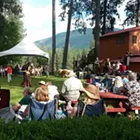But that war -- like the war in Iraq -- had its supporters. And Kennedy learned at the very beginning of his term, with the Bay of Pigs fiasco through the Missiles of October in 1962, that he had enemies within his own circle -- men he had to keep at bay in order to achieve peace and prosperity in the world.
And that was his goal, especially during his last months of life, starting in August, 1963, when Kennedy met with Martin Luther King Jr. on his march on Washington where he gave his famous, "I Have a Dream" speech. He signed a peace treaty with Nikita Khrushchev and the U.S.S.R., and he was doing all he could to stop nuclear proliferation.
In late September, Kennedy sent Secretary Robert McNamara of the War Department and Gen. Maxwell Taylor to Saigon. When they came back in October, they handed their report to Kennedy, and so National Security Action Memorandum #263 of October 11, 1963 was born.
Kennedy certainly was planning to pull out of Vietnam since NSAM #263 stated that 1,000 advisors and/or soldiers would be coming home by Christmas of 1963, and 1,000 more would follow every six months until nearly all would be home by the end of 1965.
& lt;span class= "dropcap " & W & lt;/span & hen Kennedy went to Texas on Nov. 21, this NSAM #263 was definitely on his mind as well as another matter of urgency. On Nov. 1, just when Kennedy was going to reverse the flow of money pouring into the war-makers' money coffers, the President of South Vietnam, Ngo Dinh Diem, and his brother were assassinated in a coup. Three weeks later, our President would also be dead, and, mysteriously, NSAM #263 would disappear. In fact, when the Pentagon Papers came out in 1970 giving the American people a new perspective on the Vietnam War, there was no mention of NSAM #263 at all.
It took the prompting of his children and the turning of a new century, but McNamara has come forward to tell the truth about why he misled the American people during the Johnson administration. Meanwhile, the truth about Kennedy's intentions to end the war began to slowly slip out to the public.
Now we have come full circle, back to what our 35th President was doing those last months of his 1,000 days in office. Kennedy faced a set of circumstances that hasn't changed much, as he was caught up in bitter struggles with the military industrial complex and oil interests seeking fortunes overseas.
From the start, Kennedy was having problems with the CIA, although America didn't know it; it took 12 years to come out publicly, but Kennedy fired Allen Dulles, the CIA's director. Dulles, if you recall, became one of the Warren Commissioners appointed to investigate JFK's murder. The commission concluded Oswald acted alone in killing the president, yet there is still no motive for Lee Harvey Oswald to have killed Kennedy.
Earlier in 1963, Kennedy had presented his proposals for tax reform. These proposals would have included doing away with the oil depletion allowance, the result of which could have resulted in a loss of around $300 million a year to Texas oil men.
On the eve of President Kennedy's assassination, on Nov. 21, 1963, some of those oil men gathered outside Dallas at oil baron Clint Merchison's ranch. Bay of Pigs architect General Charles Cabell was in attendance, as was his brother Earle Cabell, who was the mayor of Dallas. J. Edgar Hoover was there, as were future presidents Richard Nixon, George H.W. Bush and Lyndon B. Johnson, who would suddenly become President of the United States the very next day.
& lt;span class= "dropcap " & A & lt;/span & s an 8-year-old, I remember watching my cousin, David, depart for Vietnam back in the summer of 1961. He served five tours there. His father -- my uncle -- was a colonel in the Pentagon working for Kennedy. Colonel L. Fletcher Prouty also worked there and was one of the writers of the NSAM #263; Prouty was the character "Mr. X" portrayed by Donald Sutherland in Oliver Stone's film JFK.
For those who wonder why America continues to wage war in the world -- and why those in high office are not held accountable for their actions -- the truth is out there if you look for it.
Let me leave you with a quote from John F. Kennedy: "The very word secrecy is repugnant in a free and open society; and we are as a people inherently and historically opposed to secret societies, to secret oaths and to select proceedings. We decided long ago that the dangers of excessive and unwarranted concealment of pertinent facts far outweighed the dangers which are cited to justify it."
John Gaetano is the author of the novel America's Deceit. He'll host a screening of the director's cut of Oliver Stone's JFK at 7:45 pm, Wednesday, Nov. 21, at the Magic Lantern, 25 W. Main Ave. He'll screen his own film, America's Deceit, that same night at 5:30 pm.















